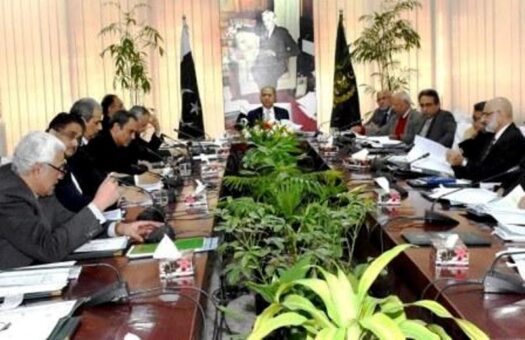ISLAMABAD: The Economic Coordination Committee (ECC) of the Cabinet has approved exemption from withholding tax on transfer of remittances into bank accounts.
The ECC approved at the meeting on Wednesday chaired by Prime Minister on Finance and Revenue Dr Abdul Hafeez Shaikh.
The ECC approved that the amount of the remittances transferred into bank accounts will be exempted from withholding tax with effect from July 1, 2020.
The ECC approved a host of measures to encourage and facilitate the overseas Pakistanis to send their remittances through official banking channels.
Under the decision, following measures for the enhancement of home remittances through banking channels were approved:
i. The rebate of reimbursement of T.T. Charges transactions between USD 100 and USD 200 will be increased from SAR- 10/- to SAR-20/-.
ii. Continuation of the New Scheme of incentives launched in 2018-19 for banks and exchange companies during the current calendar year from January 2020. As per Scheme financial institutions would be incentivized Rs. 0.50 per 1 USD on 5 percent growth, Rs. 0.75 per 1USD on 10 percent growth and Rs. 1/- per 1USD on 15 percent growth.
iii. The amount of the remittances transferred into bank accounts will be exempted from withholding tax with effect from July 1, 2020.
iv. A “National Remittance Loyalty Program” will be launched from September 1, 2020 with collaboration of major commercial banks and government agencies through which various incentives will be given to remitters through mobile apps and cards.
ECC approved a technical supplementary grant of Rs.9.6 billion during the current financial year to finance the above mentioned initiatives.
Taking up other agenda items, the ECC approved a proposal by the Ministry of Federal Education & Professional Training for a technical supplementary grant of Rs 5 billion in favour of the Higher Education Commission (HEC) for the current Financial Year 2019-20 with instruction for a judicious and need-based distribution of funds among the universities.
The ECC also approved a proposal by the National Security Division for a technical supplementary grant amounting to Rs 15 million for the Strategic Policy Planning Cell (SPPC) created in the National Security Division with the approval of the Prime Minister to act as an intellectual hub for evidence-based policy input on key national security issues.
On a proposal by the Ministry of Defence, the ECC okayed a proposal for a technical supplementary grant amounting to Rs 34.528 million for Internal Security Duty Allowance to the Pakistan Air Force.
On a proposal by the Petroleum Division, the ECC approved allocation of gas to SSGC and Provisional Tight Gas Incentive for Rehman-4 Well in Kirthar Block subject to the finalization and approval of requisite third-party certifications for Tight Gas for the same well.
The ECC also discussed a proposal regarding quarterly adjustments of the K-Eectric Limited for the period from July 2016 to March 2019 and in the light of input and discussion by the members, set up a committee including Minister for Power Omar Ayub Khan, Minister for Economic Affairs Muhammad Hammad Azhar, Deputy Chairman Planning Commission, Secretary Finance and a representative from the K-Electric to examine the issue in detail and recommend to ECC within a week a solution and roadmap for resolving the issue.
The ECC also deliberated upon a proposal by the Ministry of Energy to further extend till June 2020 the grant of subsidy to agricultural tubewell consumers in Balochistan.
Earlier, the ECC was briefed that nearly 30,000 agri consumers in Balochistan had been given subsidy since 01.01.2015 with 40 percent of the burden of subsidy born by the Government of Pakistan and the remaining 60% picked up the Balochistan government.
However, the recovery of dues from the farmers for the electricity consumed over and above the limit of subsidy had been negligible and attempts to recover these dues from defaulters in the past had not been successful.
The ECC discussed the issue in detail and set up a Committee, including the Minister for Power, to discuss the issue with the Government of Balochistan to ensure a credible solution to the problems impeding a judicious execution of the scheme for which the federal government alone was contributing Rs 9 billion annually, and also allowed the extension of subsidy until a solution to the issue was found by the Committee and put in place.
On a proposal by the Ministry of Industries and Production for revival of M/s Tuwairqi Steel Mills Limited (TSML) – A Direct Reduced Iron (DRI) Unit, the ECC discussed the issue and asked the Ministry of Industries and Production to resubmit the proposal in the light of recent and ongoing development on different issues among stakeholders on the proposal.





